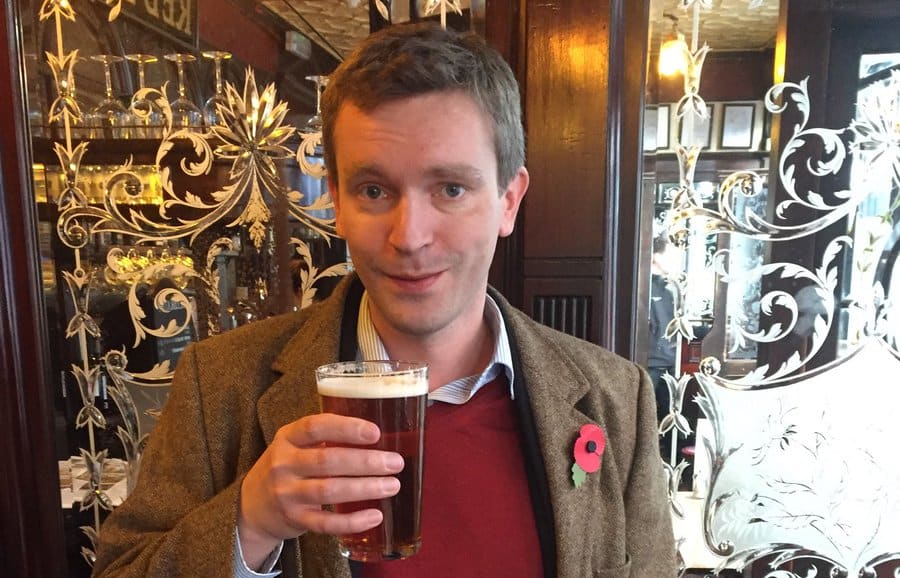Wine lakes, bacon trees, naked gin zombies and drink-crazed elephants all get a mention in a new book on the history of drunkenness.
Mark Forsyth raises a glass to our long and sometimes fraught relationship with alcohol through the ages in A Short History of Drunkenness.

Mark Forsyth Photo: twitter
Humans have evolved as drinkers, Forsyth says.
“We are the best drinkers in the whole animal kingdom by body weight, apart from the Malaysian tree shrew which can out-drink us. Never get into a drinking contest with a Malaysian tree shrew.
“We’re adapted. Alcohol is, in some senses, good for you. It contains an awful lot of energy, beer contains Vitamin B, for that matter, and about 10 percent of all the enzymes in your liver are just there to convert alcohol into energy.”
Soon after we came down from the trees we became drinkers, he says.
“About 10 million years ago we started seeking out fruit, possibly overripe fruit. Alcohol occurs naturally that way.”
This phenomenon is well-known in other animals, including a monkey in Costa Rica that sits around in the forest canopy “utterly legless”, he says.
“They can drink the equivalent up to 2 bottles of wine an hour.”
The evolutionary benefit of alcohol is that it seems to make us hungry – seen today in the 'kebab affect'.
“We would search around on the forest floor for that ripe fruit on the forest floor, our nose is amazingly good at smelling alcohol.
“It [alcohol] makes us eat more, when you get drunk and you get really, really hungry – that’s actually a deliberate process, it’s a synapse in the brain that fires.”
Historically, drunkenness has served many purposes.
“People have drunk in order to give themselves bravery, drunkenness as a method of social control, sometimes as a method of celebration. I think, ultimately, humankind cannot bear too much reality – we need something to take a little bit of the edge off.”
No culture is without narcotic distractions, he says.
"You’ll find intoxicants in every culture; what’s different in every culture is how we react to it. Do you try and ban it, do you get worried about it like the ancient Chinese did or do you embrace it like the Vikings did?"
The Ancient Greeks were serious booze-hounds, drinking wine by the barrel, not the glass, as a test of their self-control.
The Ancient Egyptians, too, were really serious binge drinkers who drank to connect with the divine.
"A big thing we don’t have in our culture today is religious drinking, getting so absolutely wasted that you have a vision of God ... I’ve got pretty drunk in my life, but I’ve never seen God.”
Some say humans moved from hunting-and-gathering to settling and farming in groups when we learned to make beer – not bread.
Beer is better for us than bread as the fermentation makes more of the energy available and it has the twin advantages of purifying water and delivering Vitamin B, Forsyth points out.
Later, spirits came along – often with disastrous consequences.
When gin arrived in London, a Hogarthian dystopia descended.
“We didn’t know how to cope with it because people drank pints of gin because they had drunk pints of beer. It was nasty. People dropped down dead in the pubs, alcoholism became rife and they would sell everything, including their clothes, just to obtain more gin.
“There were these strange descriptions – ‘London is awful it’s full of these naked people because they’ve all sold their clothes for gin'.”
And if you think the 'dinner party wine bore' is a modern phenomenon, think again.
“The Romans went on and on and on about wine and so did the Greeks.
“In High Imperial Rome, all wine had to be at least 100 years old. The Roman banquet is one where I’d least like to get drunk – a horrible, nasty, snobbish, situation where right from the beginning of the evening everyone was sat in order of hierarchy.”
The further down the pecking order you were the worse the wine you were served, and the uglier the slave serving it, he says.

